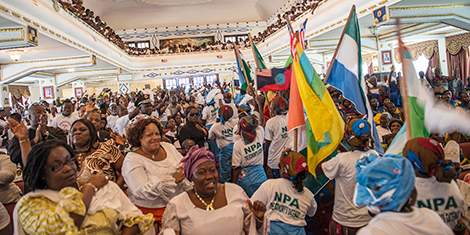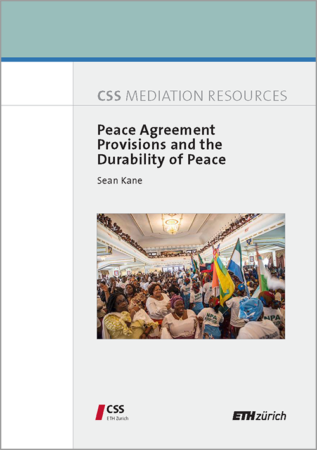Image courtesy of United Nations Photo/Flickr. (CC BY-NC-ND 2.0)
Mediation Perspectives is a periodic blog entry that’s provided by the CSS’ Mediation Support Team and occasional guest authors. Each entry is designed to highlight the utility of mediation approaches in dealing with violent political conflicts. To keep up to date with the Mediation Support Team, you can sign up to their newsletter here.
Ongoing efforts to professionalize the field of mediation have focused upon the collection of lessons learned and good practice to better inform mediation strategies. My recently published study on “Peace Agreement Provisions and the Durability of Peace” seeks to contribute to this effort by analyzing quantitative research on the empirical relationship between the content of civil war peace agreements and the subsequent duration of peace. In my experience, this is an area of direct practical relevance to mediators, who can and do influence the design of peace agreements through introducing options from comparative cases, making bridging proposals or even occasionally drafting texts.
The foundation of my study is a summarization of research findings on the impact of the following types of peace agreement provisions on how long peace lasts:
- External guarantees to enforce a peace agreement;
- Political, security and territorial power-sharing;
- Mechanisms to signal commitment, reduce uncertainties and increase costs of cheating on ceasefires;
- Comprehensive peace agreements with reforms across multiple policy sectors;
- Post-conflict elections;
- Justice/dealing with the past;
- Civil society inclusion;
- Gender; and
- Humanitarian action.
In addition, I’ve added an implementation lens to the analysis. This follows the logic that peace agreement negotiation and implementation are component parts of a single, comprehensive conflict settlement process. In line with this, empirical studies on agreement implementation can further aid mediators in understanding why certain types of agreement peace provisions are more associated with lasting peace.
My review of the quantitative literature uncovers several trends of possible value for mediators.
Provisions with Statistically Significant Impact
Factors that are believed to have evidence of a statistically significant impact on peace duration include: external security guarantees (particularly from regional or international powers); territorial and security/military power-sharing provisions; signaling efforts of the parties’ commitment to the peace process; third-party monitoring and separation of forces mechanisms within ceasefire agreements; and ensuring accommodation, participation and electoral reforms occur before any post-conflict elections. Where appropriate to the conflict and country context, I suggest that mediators may want to direct the parties’ attention to negotiating in these areas.
Provisions without Statistically Significant Links
The literature is also mostly consistent in not finding a statistically significant link between the inclusion of certain types of content issues in an agreement and peace duration. The most notable example, to me at least, relates to political power-sharing provisions. Given the centrality of political power-sharing to many civil war peace agreements, it will be particularly important for future research to attempt to sort out why this might be the case. If it is down to implementation issues related to so-called constructive ambiguity in the agreement, the prescription for mediators is rather straightforward. Namely, a greater focus upon clarity and implementability when negotiating political power-sharing arrangements. Alternatively, if it is because political power-sharing is not perceived by the conflicting parties to be a or permanent commitment to peace, a more impactful mediation strategy could be to prioritize supplementing political power-sharing with other elements of power-sharing in the military/security, territorial and economic realms.
Timing of Implementation
From an implementation perspective, I found empirical evidence that the aggregate total implementation of peace agreement provisions helps promote durable peace. Notably, peace agreement provisions related to external guarantees, political reforms, prisoner releases, amnesties, and ceasefires appear to be the most frequently implemented. Meanwhile, implementation of territorial and economic power-sharing, human rights and judicial reform, security sector reform and the return of displaced persons seem to be the most challenging to carry out. Research on the impacts of implementing particular individual provisions is still in its infancy. It does appear, however, that both in general and for political, security/military, and territorial power-sharing specifically, the time window for ensuring substantial implementation closes fairly quickly
In closing, I want to stress the importance of the prudent application of quantitative research on peace duration. Repeated studies that reach similar conclusions while making use of different data sets and time periods can increase confidence in specific findings. But even they cannot provide full certainty on the causal relationship between a type of agreement provision and peace duration. Notwithstanding this, I believe that the careful interpretation and application of the studies cited in this paper can make a fresh contribution to developing a more evidence-based practice of mediation. This is a vital endeavor as even allowing for the improved quality of peace agreements in recent decades, over 40 per cent of negotiated civil war settlements still break down and are followed by renewed fighting with five years.
About the Author
Sean Kane has worked on mediation processes and political dialogues related to constitutional reform, elections and territorial disputes for the United Nations, the United States Institute of Peace and the Centre for Humanitarian Dialogue in Iraq, Libya, Afghanistan and Syria. He is a graduate of the Master of Advanced Studies ETH Mediation in Peace Processes (MAS ETH MPP) program hosted by ETH Zurich.
For more information on issues and events that shape our world, please visit the CSS website.




One reply on “Mediation Perspectives: Peace Agreement Provisions and the Durability of Peace”
I want to attend this program if I get funding.